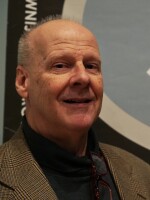Rockford poet Christine Swanberg has published her latest book. In a career that spans three decades, she’s written hundreds of poems that, in addition to her own collections, have appeared in a variety of periodicals and anthologies. During that time she mostly, though not always, wrote in free verse. But one of her first published poems was a sonnet, written while she was a young English teacher as a class assignment along with her students, and she returns to the sonnet in this collection.
Swanberg said the title, “Wild Fruition: Sonnets, Spells and Other Incantations,” signifies the overriding theme of the collection:
“The idea that, at a certain point in your life -- those of us that are in our late sixties, for example -- we can kind of look back on our lives and see that we have some kind of fruition,” she said.
But, Swanberg said, that doesn’t mean the 75 short poems are just about aging or nature. There’s a lot of adventure in the book, she said – and more. There are a lot of travel poems. There are a lot of complaint poems. There are one or two political poems, and so on.
The book is divided into five sections, each with poems that Swanberg says fit into a theme suggested by its title: “Your Great Adventure,” “A Dark Thread,” “Winter Spell,” “Ask the Gardener” and “Wild Fruition.”
Swanberg said you can read each section – for that matter each poem – and enjoy them separately, but she did try to arrange them into a cohesive whole.
“For example, she said, “in the first section, it ends with a poem called ‘Your Great Adventure.’ But in that, it introduces the idea of a dark thread. And so then the next section is ‘A Dark Thread.’ So I like to think that it’s possible to create a book of poetry that hangs together – where, if you actually read it from the beginning to the end, there would be some sort of logic to it.”
Not like a textbook narrative or outline, she said – after all, it is poetry – but something with an overriding sweep.
Most of the poems are new, Swanberg said, with a few favorites of her publisher that fit the theme thrown in. Many of the new ones are sonnets, like the poem that closes out the section “Ask the Gardener,” called “The Hummingbird Whisperer”:
Glory be to the fierce little warriors
who return to my garden each year.
Come, enjoy, drink the various nectars,
tiny bold ones, you without any fear.
Teach me to cultivate fervor and focus.
Stay in our shared secret sanctuary
created for you with bergamot and phlox,
fuchia and the feeder hung on the tree
you visit each morning. Hello! Goodbye!
Who could be freer? Fast as a torpedo
When I’m digging, spading, you catch my eye.
Faster than the wind glanced from my window.
You share delight with your earthbound sister.
You’ve made me a hummingbird whisperer.
The classic sonnet form – fourteen lines with a strict progressive rhyme scheme – while it’s in the work, is not immediately apparent to the ear when read aloud. Which, Swanberg said, is exactly what she wanted.
“One of the things my husband always tells me when I read a sonnet is, ‘Don’t tell people it’s a sonnet; they’ll never know,’ she said. “Because it doesn’t sound like a sonnet. You’d have to be really listening to the rhyme. It’s subtle. And I want it that way. I don’t want it to say, ‘Wow, I just wrote a sonnet and it sounds like Shakespeare.’ I want it to sound like one of my own poems.”
What that means has varied over the years -- which, Swanberg said, is perfectly natural. There are things she was passionate about when she was younger that she’s not as passionate about now – although, she added, they were appropriate at the time. But the biggest change she’s noticed, she says, is that writing doesn’t feel as urgent now as it did when she was first starting out and trying to find her voice, when there were thoughts – poems -- that needed to be explored and expressed. Today, it’s just something she does.
“It’s not like, ‘Oh, if I don’t write about this, my life won’t be complete,” she said. “I don’t feel that way at all anymore. It just comes out of all sorts of places, you know, and just gets on the page the way it wants to. It’s like any art. The more you practice it, the more Zen it becomes.”
Swanberg isn’t done. She said she continues to get inspiration from her life, her travels -- and her garden.
“Seriously, the birds will now come up to me,” she said, “and this has been going on for several years. And they will fly up to my face. And I can’t get them, you know, to feed out of my hand -- I haven’t tried that hard. So, you know, it’s gotten to be quite the little party out there in the garden,” she laughed.
One she hopes will continue, and find its way into her poems, for a long time to come.
“Wild Fruition” is published by The Puddin’head Press. Swanberg will read poems from the book at the monthly Waterline Writers reading event this Sunday evening (Sept. 17) at Water Street Studios in Batavia.




